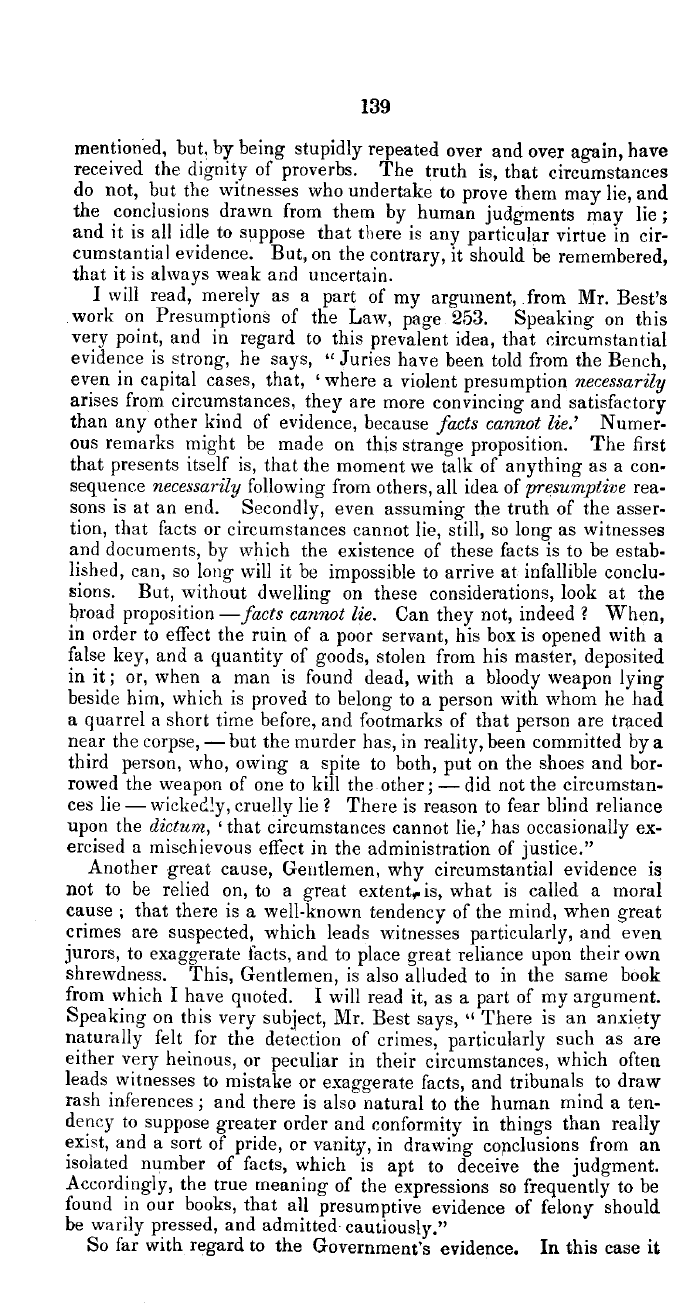|
139
mentioned, but, by being stupidly repeated over and over again, have
received the diamty of proverbs. The truth is, that circumstances
do not, but the witnesses who undertake to prove them may lie, and
the conclusions drawn from them by human judgments may lie ;
and it is all idle to suppose that there is any particular virtue in cir-
cumstantial evidence. But, on the contrary, it should be remembered,
that it is always weak and uncertain.
I will read, merely as a part of my argument,.from Mr. Best's
work on Presumptions of the Law, page 253. Speaking on this
very point, and in regard to this prevalent idea, that circumstantial
evidence is strong, he says, "Juries have been told from the Bench,
even in capital cases, that, ° where a violent presumption necessarily
arises from circumstances, they are more convincing and satisfactory
than any other kind of evidence, because facts cannot lie.' Numer-
ous remarks might be made on this strange proposition. The first
that presents itself is, that the moment we talk of anything as a con-
sequence necessarily following from others, all idea of presumptive rea-
sons is at an end. Secondly, even assuming the truth of the asser-
tion, that facts or circumstances cannot lie, still, so long as witnesses
and documents, by which the existence of these facts is to be estab-
lished, can, so long will it be impossible to arrive at infallible conclu-
sions. But, without dwelling on these considerations, look at the
broad proposition-facts cannot lie. Can they not, indeed ? When,
in order to effect the ruin of a poor servant, his box is opened with a
false key, and a quantity of goods, stolen from his master, deposited
in it; or, when a man is found dead, with a bloody weapon lying
beside him, which is proved to belong to a person with whom he had
a quarrel a short time before, and footmarks of that person are traced
near the corpse, - but the murder has, in reality, been committed by a
third person, who, owing a spite to both, put on the shoes and bor-
rowed the weapon of one to kill the other; - did not the circumstan-
ces lie-wickedly, cruellv lie ? There is reason to fear blind reliance
upon the dictum, ' that circumstances cannot lie,' has occasionally ex-
ercised a mischievous effect in the administration of justice."
Another great cause, Gentlemen, why circumstantial evidence is
not to be relied on, to a great extent,, is, what is called a moral
cause ; that there is a well-known tendency of the mind, when great
crimes are suspected, which leads witnesses particularly, and even
jurors, to exaggerate facts, and to place great reliance upon their own
shrewdness. This, Gentlemen, is also alluded to in the same book
from which I have quoted. I will read it, as a part of my argument.
Speaking on this very subject, Mr. Best says, " There is an anxiety
naturally felt for the detection of crimes, particularly such as are
either very heinous, or peculiar in their circumstances, which often
leads witnesses to mistake or exaggerate facts, and tribunals to draw
rash inferences ; and there is also natural to the human mind a ten-
dency to suppose greater order and conformity in things than really
exist, and a sort of pride, or vanity, in drawing conclusions from an
isolated number of facts, which is apt to deceive the judgment.
Accordingly, the true meaning of the expressions so frequently to be
found in our books, that all presumptive evidence of felony should
be warily pressed, and admitted cautiously."
So far with regard to the Government's evidence. In this case it
|

